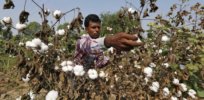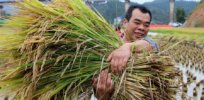International Atomic Energy Agency

More than 3,000 plants — including some organic crops — developed by mutating seeds using radiation or chemicals. Here’s an explainer
Plant mutation breeding, also called variation breeding, is a method that uses physical radiation or chemical means to induce spontaneous genetic variation in plants ...

Genetically modified crops pose unique dangers? We’ve used nuclear energy to improve fruits, vegetables and grains for almost a century–including organic foods
Getting fruits and vegetables from seed to plate is an obstacle course that involves navigating climate changes, pests and diseases, ...

Nuclear technology yields cotton ready to withstand withering heat waves brought on by global warming
[C]limate extremes such as heat waves and increasing temperatures have been impacting the cotton industry, which has seen an unprecedented ...

Genetic engineering of a different kind: Using nuclear energy in Burundi to attack cassava diseases
When Burundian cassava farmers split open the plant’s starchy root, they’re hoping to find white flesh that resembles coconut meat ...

Ratooning: Nuclear technology helps Chinese rice farmers double their yields—and their incomes
Just as grass lawns regrow after they are mowed, rice fields can regrow after they are harvested. This second harvest ...

